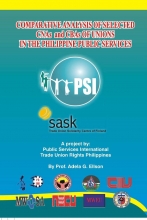Philippines: Comparative study of collective bargaining

This study of selected collective negotiated labor-management agreements (CNA - public sector) and collective bargaining agreements (CBA – private sector) had been undertaken with the premise that collective bargaining process both in the public and private sector is governed by laws and policies to avoid any discriminatory acts and that such laws and policies are implemented with uniformity. As such, the research framework was guided by an adopted model of input and output model that starts with an analysis of the basic inputs (e.g., government laws, legislations and policies) and the role of the key players (union and government offices) with the facilitation of specific government institutions (Department of Labor and Employment {DOLE}, Civil Service Commission {CSC}, Department of Budget Management {DBM}, and Commission on Audit {COA}). The research recognized the role and mindsets of the key players, labor and management in framing the contract (CNA and CBA) which contained the terms and conditions and other specific provisions duly agreed upon by the bargaining agents.
A comparative analysis of 81 CNAs and 13 CBAs of unions involved in the delivery of public services coming from the affiliates of Pubic Services International in the Philippines (PSI-Phils.) and other independent unions. Content analysis was done by identifying the common provisions and special/unique provisions to identify differences and nuances in setting the provisions of CNAs and CBAs with the purpose of using the results as a guide for future negotiations of other unions in the public services. Another objective of the study is to assess the compliance level of the public sector unions with reference to the provisions of Executive Order 180, where almost all unions showed full adherence. In addition, observations and conclusion were generated from the outputs, questions and feedback raised during the conduct of a series of forum and consultation (5 events) among the affiliates of PSI in Manila, Mindanao, Visayas, and Central Luzon.
Results indicate that the bargaining process is affected by the mindsets of the key players (roles, goals and functioning) as well as the mindsets of the implementers of the facilitating government agencies (as reflected in the differences in the interpretations of government policies).The competencies of the bargaining agents also influenced the process of the negotiation. As such, these factors led to differences in the bargaining outputs and created confusion among the public sector unions as manifested by low rate of recognition of bargaining agents and very few concluded CNAs as reflected in the records of the CSC.
Based on the results of the study, it is also ruled out that there is lack of awareness and negotiation skills on the part of the union panel on how to bargain effectively. This calls for the need to strengthen programs on awareness building, skills enhancement, and capability building. Also, there is a need for leveling the mindsets of the implementers within the government facilitating agencies to avoid multi-interpretations of the policies and guidelines that govern the collective bargaining process.
Lastly, both labor and management must be oriented that their main goal in bargaining is to decide what is necessary to harness good relationship between them. Thus, the bottom line is … what is good for the company and not for interest of a specific group.
Download the full publication Comparative Analysis of Selected CNAs and CBAs of Unions in the Philippine Public Services.

